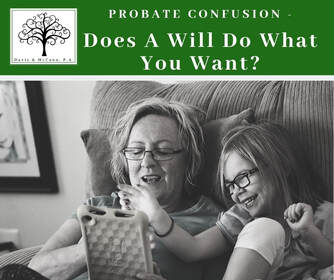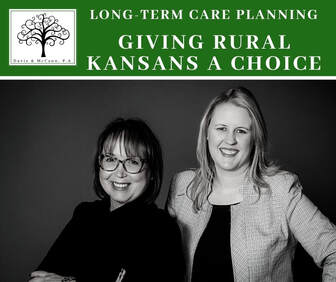 If you or a family member have faced a recent health scare, such as the kind presented by the Coronavirus, it’s likely that you’ve been told to update your Last Will and Testament. You may have had a new Will prepared or had your previous Will updated with a Codicil. While preparing a Will generally is a move in the right direction when it comes to estate planning, it may not be the “best” option for you individually. A Will is one of the most basic levels of estate planning that you can do in order to direct how and to whom your assets will be distributed upon your death. People often misunderstand the estate process and assume that their assets will automatically pass to the beneficiaries found in their Will after their death. What they don’t realize, is that assets that pass by way of a Last Will and Testament must first go through the probate process before any distributions can legally take place. To clear up some of that confusion, here are some answers to common misconceptions surrounding the probate process: 1. If you have a Will, your family will not have to go through a probate. Not true! In fact, if you do Will-based planning, you are planning for a probate. This means your estate will go through a court process and be open to public examination before your beneficiaries will receive their inheritance. Your named Executor under the Will cannot even act on behalf of your estate until the court has granted them approval to do so. 2. Probate is a simple and speedy process. This is rarely true. On average, it takes up to 16 months to settle an estate. That’s a significant wait time for beneficiaries to receive the assets you intended them to have. Additionally, you will need legal assistance if you are required to open a probate in an estate due to the complexity of the process. Professional help from a good probate attorney will be your best insurance for preventing unnecessary expenses and delays during the probate process.  The month of May is recognized as National Elder Law Month and Older Americans Month. Davis & McCann, P. A., acknowledges the growing need for legal services for senior citizens in rural Kansas and has expanded its practice to include Elder Law. To facilitate this, the firm has invested significantly in specialized training for their attorneys in the areas of long-term care planning and Medicaid. “As baby boomers enter their advanced senior years, we’ve seen a spike in the need for assistance with long-term care planning and Medicaid applications. It’s our goal to provide affordable, high-level legal advice to our clients, without them having to leave the area. We’ve increased our long-term care planning services, including completing advanced training in this area to ensure we can fulfill our commitment to our clients,” attorney Megan L. McCann says. “We develop long-term care plans that support the client’s overall estate plan. Our discussions with a client might include private pay options for long-term care, gifting, long-term care insurance or annuities, caregiver expense allowances, spend down options, or a Medicaid Asset Protection Trust. Each families’ needs are different. One may only need to discuss available options, while the next needs us to take the lead on filing for Medicaid benefits, including helping to determine allowable expenses and payments.” Tamara L. Davis, the firm’s President, is pleased with the firm’s expansion efforts. “We’ve seen significant growth in our long-term care planning and Medicaid planning practice over the past two to three years,” Davis says. “One of our goals as a firm is to make these essential services accessible to Western Kansas families. Our practice already included estate planning, business formations and contracts, real estate transactions, and probate. It just made sense to expand our practice to include long-term care planning and Medicaid planning, as more and more families look to us for help in this area. Based on the number of clients we’ve already aided, we’ll continue to explore the expansion of services in this area.” McCann and Davis are members of Wealth Counsel, a national consortium of Estate Planning Attorneys. McCann is also a member of the National Academy of Elder Law Attorneys (NAELA), an association designed to assist in education and training on elder law matters and special needs planning. In addition, McCann acts as an advisory committee member to the Southwest Kansas Area Agency on Aging and Davis is a long-standing board member for Hospice of the Prairie and Prairie Home Health in Dodge City. Davis & McCann, P. A. also offers services in simple and complex estate planning, special needs planning, business and farm succession planning, business formation, probate, trust administration, real estate, 1031 exchanges, and more. The firm represents clients from most of the counties in Western Kansas.  With all the restrictions imposed by COVID 19, those of us with family and friends residing in nursing homes have become acutely aware of the importance of quality nursing home care. Not only are sanitation and quality medical care important, but so are social, physical, and spiritual opportunities. The COVID virus has put a microscope on nursing homes and forced all of us to rethink the definition of quality care for our seniors. While not all older Americans require nursing home care, the vast majority do or will at some point in their life. Because May is designated as National Older Americans Month, this is a good time to focus on ways we can make life a little better for the generation who paved the way for us, particularly for those who are more vulnerable and require nursing home care. If you or a loved one are considering a move to a nursing home, here are some specific questions you should ask each facility: 1. What services do you provide? Specially, what type of social programs are offered and with what frequency; are there worship sessions and, if so, how often do they occur; what type of physical activities are available; are beauty services provided; etc… 2. What is the staff to resident ratio on each shift? It’s also important to ask about skilled staff turnover rate. A well run institution will have a lower staff turnover rate. Be sure to inquire about screening for criminal records, drug use, etc... for employees. 3. How much time do nurses and aides spend with residents daily? 4. What services are available for the resident as their nursing care requirements increase? Is there a separate unit for advanced dementia care?  Q: I am the sole Trustee of my own Revocable Trust. I’d like to change one of the successor Trustees that I’ve named. Can I do that? A: Replacing a successor Trustee in your own Revocable Trust is a simple process. Many people think a Revocable Trust has the same restrictions as an Irrevocable Trust, where the Grantor can make no changes to the document once it is signed. However, a Revocable Trust allows a great amount of freedom for the Grantor to make changes as long as they are competent. You may replace a successor Trustee at any time by asking your estate planning attorney to prepare a Trust Amendment to name the individual you prefer to act as your successor Trustee. You will be required to review the amendment with your attorney and sign it before a notary public. You should keep the amendment with your original estate planning documents in a fire-proof location. If you have additional changes that you would like to make to your trust, you may need to restate your Trust in its entirety or even revoke the original trust and form a new Revocable Trust. Your estate planning attorney can help you decide which option is best for your unique circumstances. It is important to note that when you want to make changes, you should not write on your original Trust document for any reason, as this may invalidate the entire Trust. For more information on Trusts, contact Davis & McCann, P. A., Dodge City, KS. We are members of Wealth Counsel, a national consortium of Estate Planning Attorneys and the National Academy of Elder Law Attorneys (NAELA). We focus our practice on providing clients with the best legal advice on Estate Planning, Medicaid and Long-term Care Planning, Special Needs Planning, Family Business/Small Business Succession Planning, Probate, Trust Administration, Real Estate Transactions, and related matters. |
NEWS YOU CAN USEDavis & McCann, P. A., Archives
April 2021
Categories
All
|

 RSS Feed
RSS Feed